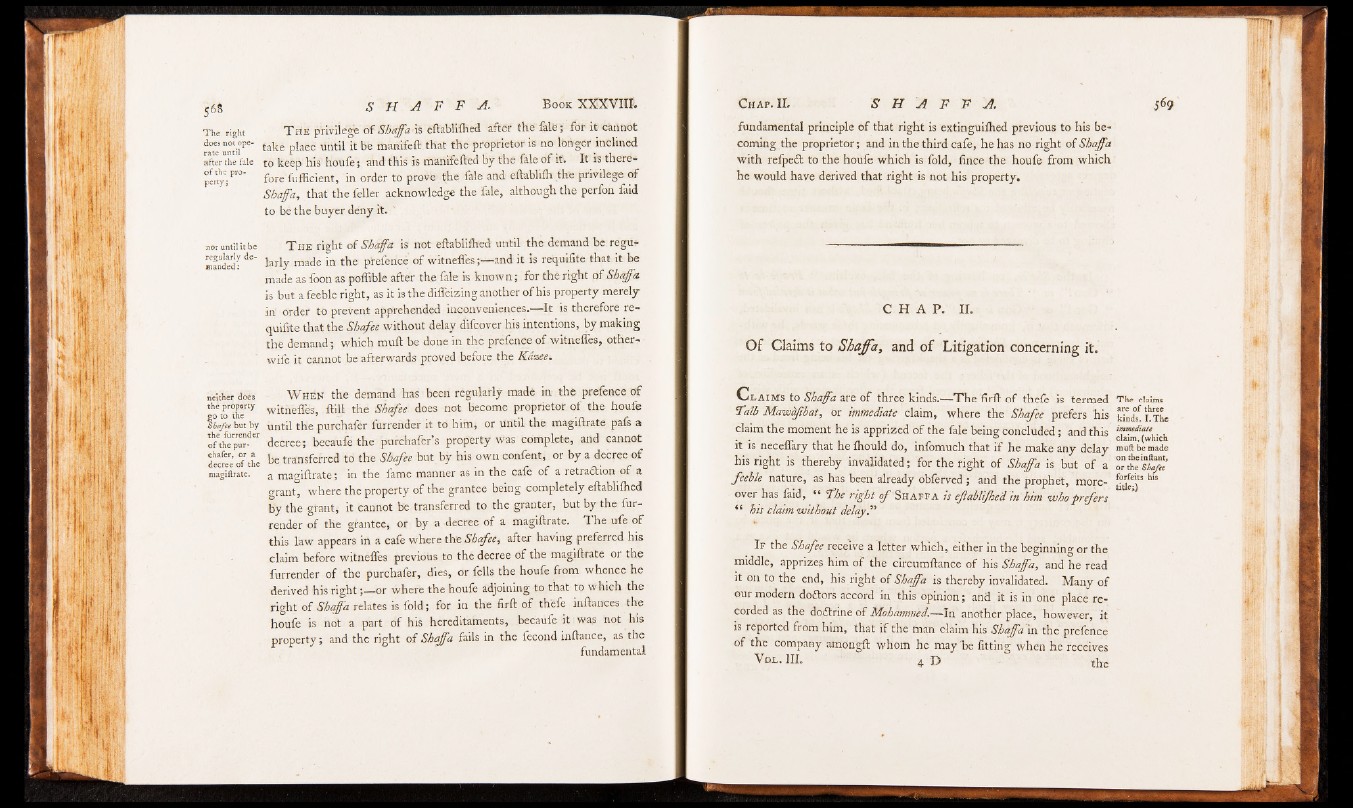
T h e right
does not operate
until
after the fale
o f the property;
nor until it be
regularly demanded:
neither does
thé property
go to the
Shafee but by
the furrender
o f the pur-
chafer, or a
decree o f the
magiftrate.
T he privilege o f Shaffa is eftablifhed after the fale - for it cannot
take place until it be manifeft that the proprietor is no Mger inclined
to keep his houfe; and this is manifefted by the fale of if. It is therefore
fufficient, in order to prove the fale and eftablifh the privilege of
Staff'd, that the feller acknowledge the fale, although the perfon faid
to be the buyer deny it. '
T he right of Shoffa is not eftablifhed until the demand be regularly
made in the prefence of witnefles;—and it is requifite that it be
made as toon as poflible after the fale is kno w n ; for the right of Shaffa.
is but a feeble right, as it is the diffeizing another of his property merely
iri order to prevent apprehended inconveniences.—It is therefore requifite
that the Shafee without delay difeover his intentions, by making
the demand; which muft be done in the prefence of witnefles, other-
wife it cannot be afterwards proved before the Kdaee.
W hen the demand haS been regularly made in the prefence of
witnefies, ftill the Shafee does not become proprietor of the houfe
until the purchafer furrender it to him, or until the magiftrate pafs a
decree; becaufe the purchafer’s property was complete, and cannot
be transferred td the Shafee but by his own confent, or by a decree of
a magiftrate; in the fame manner as in the cafe of a retraction of a
o-rant, where the property of the grantee being completely eftablifhed
by the grant, it cannot be transferred to the granter, but by the furrender
of the grantee, or by a -decree of a magiftrate. I he ufe of
this law appears in a cafe where the Shafee, after having preferred his
claim before witnefles previous to the decree of the magiftrate or the
furrender of the purchafer, dies, or fells the houfe from whence he
derived his right;—or where the houfe adjoining to that to which the
right of Shaffa relates is fold; for in the firft of thefe inftances the
houfe is not a part of his hereditaments, becaufe it was not his
property; and the right of Shaffa fails in the fecond inftance, as the
fundamental
fundamental principle o f that right is extinguiftied previous to his becoming
the proprietor; and in the third cafe, he has no right of Shaffa
with refpedt to the houfe which is fold, fince the houfe from which
he would have derived that right is not his property.
C H A P . II.
Of Claims to Shaffa, and of Litigation concerning it.
T h e claims
are o f three
kinds. I. The
immediate
claim, (which
mud be made
on theinftant,
or the Shafee
forfeits his
title;)
C laims to Shaffa are o f three kinds.— T h e firft of thefe is termed
fa lb Maw o f bat, or immediate claim, where the Shafee prefers his
claim the moment he is apprized of the fale being concluded; and this
it is neceflary that he fhould do, infomuch that i f he make any delay
his right is thereby invalidated; for the right of Shaffa is but of a
feeble nature, as has been already obferved ; and the prophet, moreover
has faid, “ The right o f Shaffa is ejlablijhedin him who prefers
“ his claim without delay.”
If the Shafee receive a letter which, either in the beginning or the
middle, apprize? him of the circumftance of his Shaffa, and he read
it on to the end, his right of Shaffa is thereby invalidated. Many of
our modern doftors accord in this opinion; and it is in one place recorded
as the doftrine of Mohammed.— In another place, however, it
is reported from him, that i f the fnan claim his Shaffam. the prefence
of the company amongft whom he may 'be fitting when he receives
V ol. III. 4 D the